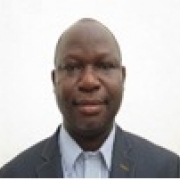
Ehijie Enato is a Professor of Clinical Pharmacy at University of Benin at the University of Benin, Benin City, Nigeria.
What is your current position?
I am a Professor of Pharmacy at University of Benin.
Can you tell us about your career path?
I’m a pharmacist. I have a first degree in pharmacy, then I did my Masters and PhD in clinical pharmacy. I’ve been teaching since 1999 at the University of Benin. I’ve also offered professional services to the Ministry of Health of Nigeria, several government agencies, as well as international partners, so I have mixed experience, both academic and programmatic experience. I’ve worked with several organizations in different parts of the world in both Europe and North America as a visiting professor and visiting scientist at different stages of my life. I rose to the ranks at the University of Benin from assistant lecturer in 1999 to a full professor in 2014.
Can you share your top career goal?
Right now, what I intend to do is to take this experience from GHDI to my community. My biggest question is, how do you take the knowledge and experience from the academic institution to the community? I’m very passionate about strengthening the primary healthcare system and the community involvement in healthcare in my country. I’m going to devote my career going forward towards that.
What is the biggest challenge you face in meeting your goal?
First, implementing changes is difficult and even more difficult in lower- and middle-income countries due to bureaucratic bottlenecks and limitations. But despite that, I’m very positive, and I believe I will be able to contribute my part to improving healthcare systems in Nigeria, and that’s what I will work toward despite any obstacles that may come my way.
What impact do you think GHDI will have on your career?
I’m happy to have come for this program. I’ve come to see healthcare delivery in a broader perspective, and I’ve realized there are different ways I can contribute to improving healthcare delivery in my country. I can say that this program has a positive influence on my going forward in regard to my goal of improving healthcare delivery in Nigeria.
What are you most proud of?
My satisfaction is when I go to the community and work with the person in the street, in the facility, and I see them happy; that makes me very, very happy. I often tell my colleagues that expertise is of no use if the community cannot benefit from it. I’m happy that that’s what I’m doing right now. A substantial part of my career is devoted to that, and I’m happy to see the people that receive the services. When I see them happy and they are appreciative, that is satisfying to me.
What advice would you give to someone just starting out in health care in your country?
Service should be the focus of the person. A person who wants to enter the health care field should be ready to serve the community. Once you put service first, there’s always a reward. Nature has a way of paying back those who serve others. I think serving the community is the most important thing.